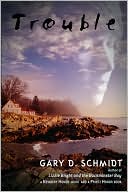 "Some books are to be tasted, others to be swallowed, and some few to be chewed and digested: that is, some books are to be read only in parts, others to be read, but not curiously, and some few to be read wholly, and with diligence and attention." -Sir Francis Bacon
"Some books are to be tasted, others to be swallowed, and some few to be chewed and digested: that is, some books are to be read only in parts, others to be read, but not curiously, and some few to be read wholly, and with diligence and attention." -Sir Francis BaconWhen you come across a book that requires chewing and digestion, you must sample it in small doses—nobody rushes a box of Godiva chocolates. To read a book wholly, you must give it your whole attention, but any extra diligence is amply repaid in the pure, premium experience of reading a Really Good Book.
Henry Smith’s father told him that if you build your house far enough away from Trouble, then Trouble will never find you. But Trouble comes careening down the road one night in the form of a pickup truck that strikes Henry’s older brother, Franklin. In the truck is Chay Chouan, a young Cambodian from
From the description, I expected Henry’s climb to take up most of the story, but Schmidt doesn’t hurry anything that deserves our whole attention. He knows how to handle a box of chocolates, and makes every page worth turning.
Example. How to Paint Character in One Line or Less: He was Franklin Smith, O Franklin Smith, the great lord of us all, Franklin Smith.
Characters that waver between main and supporting are difficult, but Schmidt creates the perfect best friend in
Scenes that anyone else would have botched—teary-eyed, father-son heart-to-heart?—Schmidt welds into the story’s backbone.
“Henry,” he said. “Henry, do you think
Henry was so startled, he took a step back.
“I know,” said his father. “How can anybody ask that? But lately, it’s the only question I seem to be able to ask. Not: Why was
Everything about this story is well done. As in, well done, good and faithful servant. It isn’t a quick read, or an easy read, but it is a book to chew, digest, and murmur, Well done!
4 comments:
Amaaazing book. So glad you enjoyed it. :)
Noel, your reviews are unlike anything else. Every time I read one of your reviews I feel like running to the library and checking it out /immediately/. You have a way with reviews!
I just finished reading The Wednesday Wars and found it so good that I would like to read more. I'll check this one out. Thanks!
Natasha, I liked WW okay, but Trouble was AMAZING!
Post a Comment